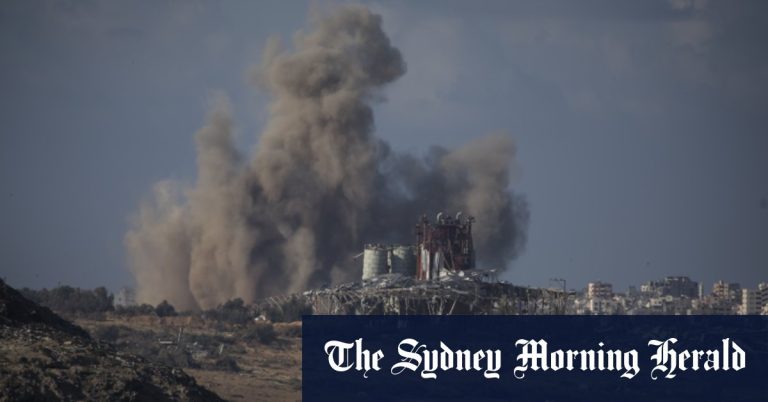Israeli bombing and incursions into Gaza began after Hamas militants from the Strip attacked Israel on October 7, killing 1,200 people and taking 240 hostage, according to Israeli officials.
It is believed that more than 100 hostages are still being held by Hamas.
The Israeli offensive, aimed at eliminating Hamas, has killed 22,722 Palestinians as of Saturday, according to Palestinian health officials, and has devastated the small Gaza enclave.
Casualty figures issued by the Palestinian Ministry of Health do not differentiate between combatants and civilians, but the ministry said that 70% of those killed in Gaza were women and people under the age of 18. The fighting has displaced most of Gaza's 2.3 million people, with many homes and civilian infrastructure remaining. It is in ruins amid severe shortages of food, water and medicine.
Fighting raged in Gaza, especially in and near the southern city of Khan Yunis, where the Israeli military said it killed members of Hamas, which rules the densely populated coastal enclave.
The Palestinian Red Crescent reported heavy shelling near Al-Amal Hospital in Khan Yunis. She added on social media that shrapnel flew inside the medical facility amid the sounds of gunfire from drones.
The official Palestinian news agency Wafa said that an Israeli air strike on a residential building on Sunday morning killed at least 12 people and injured 50 others, and another strike on a school in central Gaza killed up to four.

A convoy of Israeli forces moves through the Gaza Strip this week.credit: AP
The Israeli army said that its special forces killed a number of activists and found military equipment used by Hamas.
Standing outside a morgue in Khan Yunis, 11-year-old Mahmoud Awad said Israeli airstrikes killed his parents and siblings. He said: “We were in the Beach refugee camp and they dropped leaflets saying that Gaza is a battlefield, so we fled to Khan Yunis because it is a safe place, and they are still bombing us.”
Israel denies targeting civilians and says Hamas fighters are hiding among the civilian population and operating from tunnels under facilities such as hospitals. Hamas, which is backed by Iran and vows to destroy Israel, denies using civilians as human shields.
Blinken met with the leaders of Turkey and Greece on Saturday at the start of a week-long trip that will also take him to Israel, the Israeli-occupied West Bank, Jordan, Qatar, the United Arab Emirates, Saudi Arabia and Egypt.

US Secretary of State Antony Blinken (left) sits with Turkish Foreign Minister Hakan Fidan in Istanbul.credit: Reuters
In Istanbul, Blinken held talks with Turkish Foreign Minister Hakan Fidan and Turkish President Recep Tayyip Erdogan, who strongly criticizes Israeli military operations in Gaza. Turkey, which does not classify Hamas as a terrorist organization, unlike most of its NATO allies, has offered to mediate.
Blinken said he will spend the next few days discussing with allies and partners about how to use their influence to protect civilians and maximize humanitarian aid.
Borrell expressed his concern in Beirut about the exchange of fire between Israel and Hezbollah forces in Lebanon and the dangers of possibly drawing Lebanon into the Gaza conflict.
download
“Diplomatic channels must remain open. War is not the only option, it is the worst option,” Borrell said.
Reuters
Get a direct note from our foreign correspondents on what's making headlines around the world. Subscribe to the weekly What in the World newsletter here.

